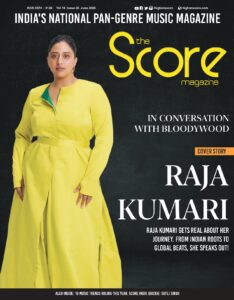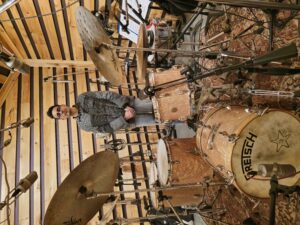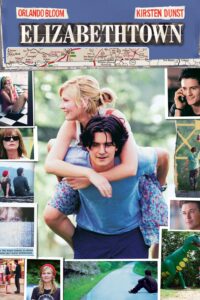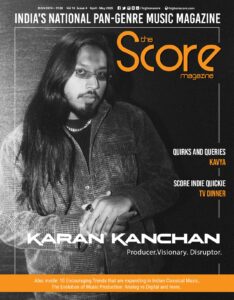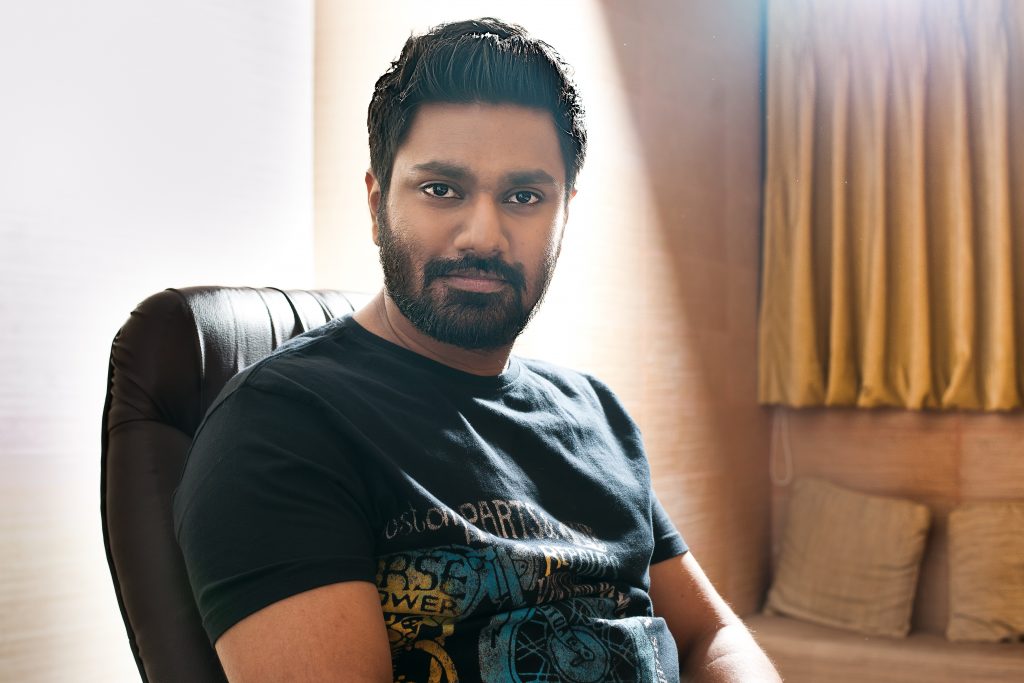He took to music as fish takes to water, thanks to his rich legacy of music that runs through his bloodline. Mithoon Sharma believes in spreading the warmth of his heart by virtue of his melodious music. The 32-yearold composer, singer, arranger, lyricist is a multitalented icon to many young aspirants in the industry, merely not for nothing. He consciously avoids adhering to the popular adage, ‘work hard, party harder’ and rather prefers to ruminate over his creations in isolation. More of a thinker than a talker, his pondering, expressive eyes say it all. In conversation with Score, this tunesmith recollects his decade-long journey and shares about his musical genes, influence of Lakshmi-Pyare, degeneration of lyrics, guest composing, quest for new voices in the industry, musical barter with contemporaries, introduction to Indian cricket spinmaster Harbhajan Singh as a singer and many more on record.
Congratulations for completing 11 years in the mainstream music industry. When you look back, how do you evaluate your journey?
In hindsight, it all appears to me as a very tiny speck on the canvas of my journey so far. It all passed too quickly with memories flashing before my eyes. It’s been more than a decade now and many hits have happened along the way with a lot of accolades falling into my kitty. However, I still feel I haven’t accomplished even 1% of what I want to do or how I would like to contribute through my music. So, plenty is yet to come and miles to cross ahead. Just wait and watch!
How has your music and you as a person evolved over time?
I think music is a very organic, human process for me and the evolution of my musicality vis-à-vis my experiences as a man are directly proportionate because both are reflections of each other. The way I think, I sense and the choices I make as a human being can exactly be seen in the music I’m scoring. When I started off at a tender young age of 19, there was certain amount of aggression brewing within me and my music would precisely reproduce that then. It is probably with progression of time that I have tempered down and have also learnt the importance and beauty of ‘thairao’ (composure).
People dub you reclusive. But with increasing stage shows and your active presence in social media, do you think your interaction with the audiences is more at a personal level now?
Well you see, I have been described as a reclusive person right from the start. During the initial phase of my career I’d like to mention that I was definitely very media shy and would not make any communication whatsoever with my listeners apart from the music I would be doing then. Deep down I feel, I’m more of a private person than people’s. It is only in recent years that I have really opened up and connected with my audiences through music. I have kind of broken thatsecluded shell to come out and mingle freely. This interaction was necessary not just for any commercial purpose but I guess as an artiste, I have some responsibility towards my ardent loyal fans, who are like die-hard faithful followers.
You have a spiritual bent of mind and your music also occasionally replicates that streak. How do you connect with God? Do you follow any daily ritual like offering prayers or meditation?
I’m a Christian by faith and don’t necessarily conform to the concept of an organised religion but I do believe that as human beings, we need to look up to something to provide us with moral guidance or someone as an ideal benchmark and that becomes part of our influence, thereby leaving an indelible impression on us. I was deeply impacted by the persona of Lord Jesus in the Holy Bible and his characteristics have had left a deep mark on my life. I have chosen this path to embrace the message of love and peace He has taught to mankind. On a personal level, spirituality should mirror the simplest things and how we deal with our friends and family, plus people we meet on a daily basis rather than merely gathering knowledge.
You descend from a reputed musical lineage. Was that always a blessing in disguise for your musical pursuit or a pressing burden since expectations to become an excellent composer must have always soared high?
I have always seen my birth into a musical household as a sheer blessing because whatever I have inherited from my genes today has stood me in good stead at all times till now. My family has basically given me the most precious gift of life, which is the zeal to chase performance of merit and quality and not any mounting pressure to succeed under. My grandfather is a key founder member of CMA (Cine Music Association) and a pioneer in many techniques, currently being used in modern-day film music. Theory, practice and perfection have always been on the priority list of both my personal as well as professional agenda and I owe that mindset completely to my near and dear ones.
You also share a very special bonding with your father Naresh Sharmaji (eminent musician and arranger). Very often, you have called him a Superman and your real hero. Can you explain this imagery?
I think every child looks up to his father as an ideal hero and my case was no different. The obviously connect grew even stronger because as a kid, I would frequently accompany my dad to his studio sessions and back then, music recording was more acoustic in process and had involved a lot of people on the production floor. Everytime I went with him to his workplace, there would be a 100 people milling around inside that confined space with utmost respect in their eyes for him. I would be fascinated to see one man taming rows of musicians as a conductor, as if cast under his hypnotic spell. Hence, I’ve spoken of the ‘superhero’ metaphor. Even the music composer would fall back on him for his deep trust in him. He would look up to his arrangement and wait for the recording to happen smoothly.
To perceive my father command that kind of magnetism and dignity with dedication towards his vocation gave me a direct inspiration and enough reasons not to seek a superhero outside but within the family to follow and idolise. My dad has not only mentored me but has also supported me all through like a guiding star.
You were born and brought up as a scion of a pedigree with musical genes. Was your childhood any different from your peers and playmates? How would you balance studies with your passion?
I started learning music at the age of 11 and would say till 15, I had a balanced life where music was part of my regular routine along with academics because my mother was very keen that I pursue my schooling diligently. It was only after that I decided to take up music as a full-time career. There was a fire smouldering inside me to prove myself as a musician and I would rehearse for eight long hours everyday. By 18, I was my father’s chief assistant and at 19, I did my first filmZeher. So studies eventually took a back seat because of my passion for music.
You have always mentioned the renowned musical-duo Lakshmikant-Pyarelal as your first inspiration. How would you define their august repertoire of timeless gems?
LP as the legendary duo would be famously called had an illustrious inventory to be befittingly tagged as the textbook of Hindi film music. Both were versatile geniuses and their range was evergreen with everlasting appeal. I have always admired their creations right from their debut movie Parasmani up to the zealous score of Khalnayak and so much in between. Every Indian composer should refer to their works as a handy material. Apart from film songs, one should also never forget the revolutionary background tunes contributed by them.
Which other national/international musical artiste influences you with his/her great body of works?
You see, world music is replete with all time greats and their remarkable inputs to the ocean of musical sounds, beats and rhythm are immeasurable. A lot of the musicians have impacted me since childhood like Madan Mohanji, Salil Choudharyji and later on A. R. Rahmansaab. All have been really inspirational for me and globally as an instrumentalist, I used to look up to personalities namely, Oscar Peterson, Chick Correa, Miles Davis, who were introduced to me by my jazz teacher, Tony Pinto. As far as film scoring is concerned, I have always been a huge fan of John Williams and his epic themes.
Is any musical collaboration in the pipeline?
Yes. With the burst of digital medium and avenues opening up for independent, individual music, I would love to collaborate and do something apart from my film assignments.
What about your upcoming concert tours?
I have been working on a very novel idea with regards to a live concert. It is an idea-based presentation where I’m going to put together 20 of my most popular songs in a completely re-designed avatar to exclusively suit a live stage audience. It is also based on a new script, written to enthrall listeners in close proximity. This project is being produced by PEN India.
After successfully setting tuneful notes for the Malaysian movie Diva, did you seriously contemplate about establishing your career overseas, as that could have been a key to opening up several other doors of opportunities?
I scored the music of Diva at quite a nascent stage of my career and at that time, my focus was solely on Hindi films. Post this Malaysian sojourn, when I returned to India, I did some of my most cherished works like Anwar, The Train, Lamhaa and Murder2. Today after doing 10 years of non-stop Hindi film scores, I think I’m now lot more interested in doing musical gigs on international platforms.
Post record-breaking rage of ‘Tum Hi Ho’, were you a bit apprehensive of getting typecast in the industry as overnight you became the new ‘melody king’ of town, though thrillers likeCreature and Ek Villian have streamed in a diverse palette from your kitty?
I believe, music comes very naturally to me and that’s why, I have never been concerned about being typecast or bothered with the external factors like getting stagnated or building a so-called image, pertaining to one’s trademark music. I have always done music straight from my heart and have in fact, seen that my music has stirred up a generation of composers, especially after Ashiqui2, I see a specific trend and pattern of melody in Hindi film music, all following that heart-warming romantic way.
After a brief hiatus, you revived the singer in you to pleasantly surprise your fans with the racy dance number ‘Mehboob Ki’ from Creature. But the honest music-maker in you has always regretted about not having a trained voice or doing regular riyaaz. Comment…
I really enjoy singing and I frequently deliver my vocals at the church but I think when it comes to professional music, a certain amount of skill and finesse are required to pull it off effortlessly. I would like to put in similar amount of effort into training my voice. I like its texture but I need to work on my breathing and once I am little free from my busy schedule, I would like to practise that to perfection.
Your impressive endeavor in the duet ‘Ai Mere Humsafar’ (a tribute to the superhit song of 1988 blockbuster, Qayamat Se Qayamat Tak) with Tulsi Kumar from the rom-com All Is Wellwas yet again lapped up by music lovers. But this isn’t your maiden remake version. In fact, you had debuted with ‘Woh Lamhein Woh Baatein’ (originally a song of Pakistani band Jal) for Zeher and consecutively with ‘Aadat’ (another track of Jal) for Kalyug. What according to you should a scorer keep in mind while reprising or recreating a song as it involves a lot of responsibility to do justice to its original status, yet at the same time, give it a contemporary spin?
I remember when I entered this music industry as a fresher, there was no concept of recreation then as such. I worked more like a music producer for over a string of songs. Even the job-profile of a music producer was not that well-defined. But I came on board solely in that capacity since the compositions I got to dabble in right at the beginning of my career, were not mine alone. But after that, I never had any intention of reproducing others’ songs and instead, had wanted to establish myself as an independent music composer. It was only a decade later of writing original music that I got an offer to recreate the popular love song, ‘Ai mere humsafar’ from the 80s’ superhit romance, QSQT, although I was initially hesitant to take up the project. But I finally gave my consent as the producers were very keen that I only do it and I think it’s a beautiful song and I had definitely enjoyed the whole process of redoing it.
However, now I have strictly decided not to indulge in any more remakes or remixes and I don’t feel it’s a healthy trend for our film fraternity either, because I think we have enough talented composers to churn out good, original piece of music. So I’m consciously against this tide of rehashing good old songs. My only advice to my fellow musicians is to stick to their creativity and generate their own notations as that’s what will ultimately augur well for the industry’s future enrichment. It’s not a bad idea at all to revisit the yesteryear gems, more so, if done with one’s individual twists and turns. But I would like to make an earnest request to all to please kindly abstain from blind copies and lifts.
You are again working with filmmaker Onir for his much-touted venture Veda. He has a knack for telling issue-based intense stories within a commercial format and you seem to have a comfort zone and good understanding with him since Bas Ek Pal. Tell us something about the vibe you both exchange while coordinating over a venture and the tunes that you are scoring for Veda.
I think it’s too early to speak about Veda at the moment. It’s Onir’s dream project and he is working passionately on it but we are yet to reach a point where we start with the musical sessions. Besides, I would like to emphasise that I share a great comfort zone with the very cerebral filmmaker Onir. Music of both his movies — Bas Ek Pal and Shab has been highly appreciated. The area where I connect with him is what he and I like most in music. I have always stressed on the emotional content of my songs and that’s what he always seeks in his film’s playlists. He will end up crying if he hears a good song in the studio and that’s how sensitive he is.
Current-day crop of young music directors not only show sparks of immense talent in terms of melody, beat and tempo but are also well-equipped with the technical knowhow of music programming and production. Do you agree that this is a compulsory requirement in the age of digital technology?
Technique and theory have always been an integral part of recording a song even before the digital age boomed. Back then, the method was more acoustic and it demanded the know-how and technical understanding of orchestration as well as arrangement. Whereas today, the experience has become more electronic in nature. But the role of a musician is still the same and being an arranger’s son, I don’t think I’m the wrong person to comment on this.
I grew up training to be a technician first and then a composer. Fact is I have seen my father do the arrangement and production for all the leading composers of his era. It was under his guidance that I learnt to be an arranger first and then a music director. Plus, in my entire career, I have hitherto programmed, arranged and produced all the music myself. The advancement in technologies has rendered a new facet to music production and yes, I would agree that the arrival of these new technical intricacies does put the challenge of grasping the ropes first before utilising the same into music.
Any rank newcomer should therefore devote sufficient time to assimilate these fundamental aspects so that he/she can employ them to enhance his/her brand of music.
When you cast a new voice for your songs, what essential qualities you tend to look for in the singer? How easy or difficult is it to work with and prepare a newbie behind the mike?
The most important quality I extensively hunt for in a singer is the honesty in his/her expressions. I’m allergic to plastic renditions and neither am I a fan of fake perfection. I don’t mind a few flaws here and there but I rather lend priority to sincere articulations. I prefer working with greenhorns because they give me the amount of time and effort I command while creating my songs. That is why some of my chart-toppers have been with relatively new singers and some of the most loved singers in the fraternity whom I have a personal fond equation with are Atif Aslam, Shilpa Rao, Mohd. Irfan, Arijit Singh, et al. All these guys have had their first song under my directorial tunes.
Your album Tuhi Mere Rab Ki Tarha Hai was critically acclaimed and many have noticeably appreciated its quality output on the networking sites as well. Despite the fact that you are running a hectic timetable and wish to solely concentrate on your film assignments, aren’t you in a way depriving all the fans of independent music, who are sold on your unique, individual sound, which is unrestricted by Bollywood constraints?
After Tu Hi Mere..I got tied up with a string of plum film offers like Murder 2, Jism 2, Lamhaa andAashiqui 2 and I could not give time to anything else. But now I have organised myself in a much better fashion. I have finally set up my own studio with a highly dedicated team working on the parallel projects. Well, I’d definitely want to be part of the larger independent music scene on the digital medium and I will be surely venturing out into that direction later this year.
You are not averse to dance numbers and have conjured up quite a few chartbusters in the said genre. But you are dead against item songs. Why so?
I’m not outrightly condemning item songs but at the same time, I still haven’t really gripped the exact meaning of the term, let alone its controversial baggage of vulgar shots and profane language being used into certain tracks. I just feel that as composers, it’s very interesting for us to create good quality music within the inspirational premise of the script and there is certainly no need to thrust a number into situations, under the pretext of promotion and commercial entertainment. Often songs get filmed on the blunt excuse of grabbing attention and minting money, which I fail to digest.
Shivaay’s music somewhat stood out of the crowd, especially the Shiv vandana ‘Bolo Har Har’ with a judicious mix of high-voltage orchestration, shlokas, soothing poise and a constellation of high-profile star-singers like Sukhwinder Singh, Mohit Chauhan, Badshah and Megha Sriram Dalton. How tough was it to manage such a grand-scale production when all recorded the song together? Also what was the brief given to you before creating such a heavy-duty composition?
The brief dispensed by actor-director-producer Ajay Devgn was to craft out a song that represents the fanatic enthusiasm and passion of the character he portrayed in Shivaay. He did not want the song to symbolise any one particular culture, region or country but connote a more universal and one world feeling. Keeping in mind the film’s genre, the title song had to be high on energy and pulse.
I chose to bring in various singers together to share a common space and give the end result a more collective feel. The primary objective was to import diverse expressions, intonations and interpretations of a definite character through a plethora of different shades.
Mohit spelt a disconnect with the organised world, underlining the vagabond essence of the song, Sukhvinder fetched in sheer determination with an unstoppable energy, Baadshah carried some sort of dominance and style, while Megha Sriram encapsulated the warmth and the core of an earthy fabric in the song.
As a lyricist when you hold the pen, you become responsible for the words your creative juices ooze out. Given the kind of double-meaning wordings that are often used in today’s songs which critics call crude, unpleasant and distasteful, does it hurt and annoy your poetic instincts if the expressions border on the offensive?
I have always heard words such as divine, sincere and heart-touching from people who define my music and the songs written by me. I believe that my music should uphold the very moral values I stand for in life. So I have a huge responsibility involved here to live up to. There is no place for any vent in my music that is unpalatable or I don’t relate to. The songs I have penned the lyrics for may not be poetic stunners or be grammatically impeccable but I take immense pride in the fact that they signify a certain value system, ethics and virtues I can gladly vouch for. That’s my stance as an artiste as well as a songwriter and I do not judge others who think any differently.
What inspires you as a writer? Which poet/lyricist do you adore and why?
You see, human life is a very big well from where the greatest of poets have drawn inspirational waters to quench their creative thirsts and I too have frequently given in to that temptation. There are stories floating all around us, amongst us and we just need to hear them out with the right mindset and approach to be able to convert them into nice poetry. One writer who have had a great impact on my penchant for compiling verses and poetic thoughts would be Saeed Qadrisaab who I remember having first met as a teenager and like a guardian angel, he played an instrumental role in my career to hone my writing skills. He did whet my appetite to further raise the bar of creativity and enhanced the quality of my songs with his rich poetry. Besides him, I have always admired the works of poets like Raja Mehdi Ali Khan, Hasrat Jaipuri and Saahir Ludhianvi.
You have also worked as a guest composer in recent releases like Wajah Tum Ho and Half Girlfriend. Is that a challenging proposition when you are not working on full scores and only constitute part of a given project? Does it not hamper your musical creativity?
Well I don’t know about others. But I can only speak for myself and that is, it does not thwart my musical creativity at all. For me, be it a single track or an entire playlist, I attempt both with a respectful attitude and in either case, even if am doing one song, it should last a lifetime for me and there is no reason why that single should be short-lived or underperformed just because it is the sole contribution to a group album. As a matter of fact, some of my best songs have come out in shared albums whether it was Bas Ek Pal, Anwar, Aashiqui 2 or Half Girlfriend.
Enlist your forthcoming films as a composer.
A slew of upcoming endeavours is lined up for final shape. For example, Aksar 2, Sons of Sardar 2, etc.
How comfortable are you with the idea of actors singing in films, given the fact that actress Sonal Chauhan too has sung to your notes composed for 3G?
I personally have no qualms with actors crooning into films, provided they have a basic connect with the musical craft and at some level, they can sing as well. So, no issues on my part and in fact, here’s wishing a very good luck to all those, who are taking the plunge seriously to test a different ballgame altogether.
Usually, whose call is it anyway? Does the music director have any say to include/exclude an actor from his own composed playlists? Or is it totally the producer’s prerogative to take that decision as a marketing gimmick?
Many a time, an actor’s induction to be featured as a singer on the movie soundtrack is a marketing trick and as an upright musician, an actor is definitely not my first choice to lend vocal chords for any of my tracks unless he/she is extraordinarily gifted as singers. But as a professional, I do precisely draw a hunch about these market dictates and genuinely have no reservations against co-operating with any actor pitching in as a singer in the larger interest of a film, only with the condition that it is executed as a secondary, unplugged version or a reprised edition or a cover track.
Musical trade-offs are very common in the music industry wherein one tunesmith-vocalist sings for another composer and vice-versa. For instance, your very talented good friend Ankit Tiwari has sung for you in Sanam Re. How do you view this camaraderie and does this kind of a mutual rapport augur well for the industry?
See inside the studio, I’m nobody’s friend to be very frank as there it is just a composer listening to a singer and taking a call. It’s a practical world after all and we as seasoned pros can’t dilute that principle when it comes to work. I thought Ankit’s voice aptly suited my song in Sanam Re to the tee and that’s why he was on board to deliver the goods. Look, these little trivial things and minor changes of adjustment do not make any tangible difference to the industry. What counts the most is that we all work hard and intend to make some good, ear-pleasing music to captivate our audiences. And that is very important.
Would you ever sing for any fellow composer?
Honestly to speak the truth, I’m never comfortable with this idea, though I have got a few offers on this front in the past.
News has gone viral that you are synergising with none other than ace Indian off-spinner Harbhajan Singh over an interesting project. How did it fall in place and what is it all about?
It’s actually a thought that Bhajji shared with me. We have been close friends since a while now and he has always expressed his keen interest in music. He wanted to do something to celebrate our national heritage and culture. We were always contemplating on working together and were in talks for collaborating on a single since over a year now. This concept cropped up on his birthday and while many ideas got exchanged, this one particular struck us the most.
I always believe that music should address a higher purpose and collaboration of ideas must carry meaning to the fore. This would be Harbhajan’s debut shot at singing and he is already taking lessons in the studio to perfect his grip on the art and sounds super-excited about his new task at hand. The song will celebrate the contribution of real life heroes who strove hard towards the nation’s welfare. The single will be sung in Hinglish and premiered in December by this year-end. The video song will be picturised across different states of India, featuring the real lives of the common man, who are the actual driving force of our country.
Hitlist:
Zeher — ‘Woh Lamhe Woh Baatein’
Bas Ek Pal — ‘Bas Ek Pal’, ‘Tere Bin
Anwar — ‘Maula Mere Maula’, ‘Javeda Zindagi’
The Train — ‘Beete Lamhein’
The Train — ‘Mausam’
The Train — ‘Woh Ajnabee’
Lamhaa — ‘Madno Re’
Murder 2 — ‘Aye Khuda’, ‘Phir Mohabbat’, ‘Aye Khuda’
Jism 2 — ‘Yeh Kasoor’
3G — ‘Kaise Bataaoon’, ‘Khalbali’
Yaariyan — ‘Baarish’
Samrat & Co. — ‘Shukr Tera’, ‘O Humnavaa’
Ek Villain — ‘Banjaara’, ‘Zaroorat’, ‘Humdard’
Hate Story 2 — ‘Hai Dil Yeh Mera’
Creature 3D — ‘Hum Naa Rahein Hum’, ‘Naam-E-Wafa’, ‘Ik Pal Yahi’, ‘Mehboob Ki’
Alone — ‘Awaara’
Hamari Adhuri Kahani — ‘Humnava’
All Is Well — ‘Mere Humsafar’
Love Shhuda — ‘Mar Jaayen’
Sanam Re — ‘Tere Liye’ and ‘Sanam Re’
Ki and Ka — ‘Ji Hazoori’
Shivaay — ‘Bolo Har Har Har’, ‘Darkhaast’, ‘Tere Naal Ishqa’
Wajah Tum Ho — ‘Wajah Tum Ho’
Half Girlfriend — ‘Phir Bhi Tumko Chaahunga’
Mithoon was featured in our October 2017 issue as the Cover artist: http://bit.ly/2g4IDfR

